Brian Clegg's Blog, page 54
June 7, 2016
Songs are commodities - get over it, performers
 Hardly a day seems to go by without some egotistical musician proclaiming they don't want some individual or some organisation they happen not to agree with to use their music at an event. I suspect this reflects the general feeling that being a musician is being an 'artist' and as such, one should retain control of one's work. As far as I'm concerned this is rubbish.
Hardly a day seems to go by without some egotistical musician proclaiming they don't want some individual or some organisation they happen not to agree with to use their music at an event. I suspect this reflects the general feeling that being a musician is being an 'artist' and as such, one should retain control of one's work. As far as I'm concerned this is rubbish.A song is a commodity. If someone buys it and pays the appropriate reproduction fees it should be entirely up to them how they use it. There is no sense that it suggests the artist is supporting the cause or an individual who is playing it. It's just background music.
Think how bizarre it would be if I said that I don't want people using my book, say, to prop up the leg of a wonky table. Feel free to do so - buy as many as you like for this purpose. For that matter, provided you don't misquote me, and pay attention to copyright/copying fees etc., feel free to use text from my books as a backdrop to your events. Whatever they are. If I don't agree with you, that's fine. I'm not making the statement about your cause, any more than the manufacturer of the paint on the walls is.
Get a grip, music people. Deflate those egos a little.
Published on June 07, 2016 00:47
June 6, 2016
By Light Alone review - Adam Roberts
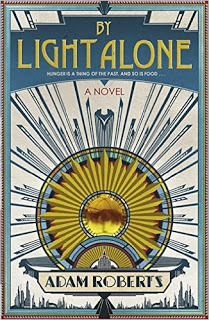 I have only relatively recently discovered Adam Roberts, with the likes of
Jack Glass
and
The Thing Itself
, but every one of his books I've read has been excellent, so it seemed time to start filling in the gaps.
I have only relatively recently discovered Adam Roberts, with the likes of
Jack Glass
and
The Thing Itself
, but every one of his books I've read has been excellent, so it seemed time to start filling in the gaps.I went for By Light Alone because of its interesting sounding premise. It's a cracker (as they say). The idea is that science has produced a mechanism where people can get all the energy they need from sunlight, thanks to a bug that turns their hair into super-photosynethic light absorbers. All they need to live is some water and a few essential nutrients. A clever (if technically verging on the impossible) idea, certainly. But where Roberts triumphs is in going into the unexpected implications of the change - the absolute heart of what makes science fiction, and which so few literary types who do SF down, and think it's all about spaceships and ray guns, appreciate.
One implication considered is that for the first time ever it's possible to have a group of people who have literary no money at all. Not just poor but literally penniless. Roberts also examines the possibilities for male/female distinctions, and how a small group of wealthy people might consider those who have the special hair to be a subspecies, and to conspicuously wear their hair short to emphasise they don't need it.
The book is divided into four parts, each seen from a different (but linked) individual's point of view. At the heart of the book is the story of a privileged family whose daughter is taken from them on a skiing holiday. They assume initially it is as a hostage, but the authorities gradually explain that something much darker is behind it.
The one fault I would say that the book has is that the forth segment, which is the longest, seen from the viewpoint of the captured daughter, is the least effective. It's partly because the environment she is in forces a slow, plodding development, with occasional dramatic outbreaks of violence, but also because it just doesn't work quite as well as the other sections. It's good, but the others are brilliant.
If you want to see what good, modern science fiction is like - or are looking for a new author to branch out into, Adam Roberts is an obvious choice. I wouldn't go straight to his latest, The Thing Itself, as it is his most complex book, but either By Light Alone or Jack Glass would make an excellent way in. Recommended.
By Light Alone is available from amazon.co.uk and amazon.com.
Published on June 06, 2016 01:37
June 2, 2016
Lies, damned lies and viewing figures
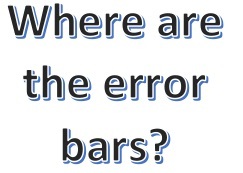 I read in the
i
newspaper that Britain's Got Talent 'recorded the lowest audience figures in the show's ten year history.' How do they know? Because 'on average 8.5 million viewers watched the final... [recording] a peak audience of 10.5 million viewers.' But how can they know that? They can't - and worse still, the method of discovering it is far less reliable than it used to be.
I read in the
i
newspaper that Britain's Got Talent 'recorded the lowest audience figures in the show's ten year history.' How do they know? Because 'on average 8.5 million viewers watched the final... [recording] a peak audience of 10.5 million viewers.' But how can they know that? They can't - and worse still, the method of discovering it is far less reliable than it used to be.These numbers are based on a sample. A few thousand brave volunteers register what they watch on little boxes - the data is then aggregated and multiplied up by various esoteric factors to try to make the sample truly representative. As polls often show, this kind of multiplying up has many problems and often doesn't work very well. But at least it was relatively simple when this system first started to be used. You either watched some or all of a programme, or you didn't.
Now the viewing audience is painfully splintered. We, for instance, hardly ever watch anything when it is broadcast. We either watch it recorded on a YouView box, or using catch up. And a fair proportion of the time we're viewing via more indirect streaming from the likes of Netflix. So, for instance, a couple of months ago, we watched Series 3 of Call the Midwife on Netflix. Even if we were part of the sample (which we aren't) there is no way that would count towards the viewing figures when it was first broadcast in 2013.
Of course not everyone watches the same way we do - but that's the whole point. For example, we hardly ever watch TV on phones or tablets - but some do all the time. This fragmentation makes the margin for error on the statistics potentially much larger. I have never seen any error bars on viewing figures (why not?) - but by now they must be pretty enormous. I honestly don't think the public is too thick to cope with a range rather than a single figure - and it would make the statistics far more honest than they currently are.
Published on June 02, 2016 06:04
May 30, 2016
Should you love your job?
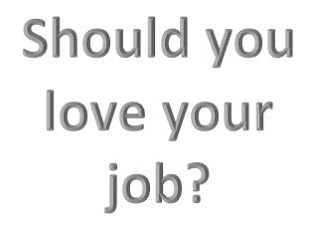 Thanks to Eric Doyle on Facebook, I came across an article written by Janelle Quibuyen, who was complaining that 'quitting your job to pursue your passion is bullshit.' I'm afraid it was a piece that totally missed the point of working for yourself. And as someone who made the shift 20 years ago, and hasn't had a proper job since, I wanted to stick up for those who take the plunge.
Thanks to Eric Doyle on Facebook, I came across an article written by Janelle Quibuyen, who was complaining that 'quitting your job to pursue your passion is bullshit.' I'm afraid it was a piece that totally missed the point of working for yourself. And as someone who made the shift 20 years ago, and hasn't had a proper job since, I wanted to stick up for those who take the plunge.Firstly, it is important to say something about the 'your passion' part of 'pursuing your passion', which seems not to have occurred to the author of the article. Just because you are passionate about something doesn't mean you are good at it. Few passionate football fans are potential professionals. Shows like The X-Factor demonstrate the gap that can exist between enthusiasm and ability all too clearly. So to make this kind of thing work, you need to be objectively sure that you are at least competent. Don't rely on your own opinion or that of your friends and relations - they will lie. Have a go in your spare time and see if anyone will pay you for it. Of course you can get better, and you will if you go for it full time - but you have to have some initial aptitude.
Try, if possible, to arrange some kind of transition, so that you don't go straight from employed to nothing coming in. It will almost certainly be bumpy - you might need to change accommodation arrangements, rely more on a partner/move back with your parents for a while. And it could end in failure. No doubt about that at all. But if you have a passion and you're genuinely good at it, you are going to kick yourself if you never try.
Taking the plunge is inevitable a compromise. You will have to weigh positives against negatives. I still don't earn as much as I did when I left my job 20 years ago - so you may well have to plan for a cut in income. One of the things we did about this was to move from somewhere it was expensive to live to somewhere cheap. Unlike our friends who stayed around the London area, we aren't sitting on a million pound house now. But in exchange for having less capital, I was at home most of the time while my children grew up - far more than I would have been if I had left the house at 7am and got back at 6.30pm. And we got to live in the country, rather than the suburbs, where I think the children had a better life.
Similarly, you do have to weigh potential loss of earnings against really enjoying your working day. I don't dread Monday morning, I look forward to it. How much is it worth to spend one of the biggest chunks of your life doing something you love, rather than something you hate? And if I had stayed in my job, when I retired, I would have had far less to look back on and think 'I did that' than is the case since I became a writer.
Of course, as the article suggests, there is a degree of uncertainty. Sometimes it is hard to get enough money coming in, and you've got to be prepared to be flexible, to have a portfolio job, rather than always doing the same thing (though I've found that part of the positives). But bear in mind that the impression of certainty from a salaried job only lasts as long as they don't decide to lay you off. At least when self-employed you can do something about it - you aren't a victim.
Also, as the article suggests, not everyone leaves a job because they have a passion, and not everyone has the kind of drive required to do it all yourself. It seems likely that Quibuyen doesn't. And that's fine. Self-employment and attempting to live the dream is not for everyone. But to suggest, as she does, that somehow this is something only privileged middle class people can do is the real bullshit here. Quibuyen says 'The statement [quitting your job to pursue your passion] reeks of privilege. It confirms you had a full-time job to begin with. It confirms you had time to develop a passion (that you can capitalize off of, enough to meet your cost of living). It confirms you had the option to pursue something different because you feel like it. There are more challenges to being self-employed than just mental perseverance and grit. We are predatorily luring working class people into an entrepreneur lifestyle as the answer to living a meaningful life and loads of money.' I find that patronising and simply untrue as a blanket statement. There are plenty of working class people who successfully set up their own business, doing something they really wanted to do. She seems to suggest that if you are working class you can't have aspirations or a passion. I'm sorry, that's so condescending.
To make this kind of thing work needs personal drive and a certain amount of luck. I was lucky, for instance, that the company I was working for was offering voluntary redundancy, so I didn't have to go from earning to nothing in one go. But the fact remains that for some people, whatever their background, taking such a move can really work. It's not a universal panacea. It definitely isn't for everyone. But I'd suggest if you aren't happy with what you do in life, it's at least worth thinking through.
Published on May 30, 2016 02:21
May 28, 2016
Where'd it go?
I'm afraid it's that time of year again, when blogging becomes difficult, thanks to all the exciting alternatives like trimming the hedge, cutting the lawn and arguing on Facebook about EU referenda (okay, that doesn't happen every year) start getting in the way, and posts become somewhat sporadic. However, I would like to assure my reader that I've not given up. As a bigger and more Austrian person once said, 'I'll be back.'
Published on May 28, 2016 07:59
May 24, 2016
The Pie at Night - Stuart Maconie - review
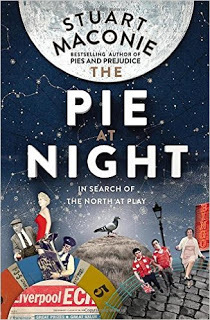 * See footnoteI've never been a fan of the 'hello sky, hello grass,' Fotherington Thomas school (or should that be skool?) of travel writing that is packed with purple prose and lengthy descriptions of scenery. What does the trick for me is a travel book that explores the (often humorous) interaction between the writer and people and places, preferably with more urban and suburban adventures than countryside and wilderness. When it comes to plain humour, the master of this genre is Bill Bryson (even if he did freewheel a little in his latest), but if you want a combination of humour; wry, intelligent observation and lyrical writing, the trophy has to go to Stuart Maconie.
* See footnoteI've never been a fan of the 'hello sky, hello grass,' Fotherington Thomas school (or should that be skool?) of travel writing that is packed with purple prose and lengthy descriptions of scenery. What does the trick for me is a travel book that explores the (often humorous) interaction between the writer and people and places, preferably with more urban and suburban adventures than countryside and wilderness. When it comes to plain humour, the master of this genre is Bill Bryson (even if he did freewheel a little in his latest), but if you want a combination of humour; wry, intelligent observation and lyrical writing, the trophy has to go to Stuart Maconie.Whether he is exploring his experience as a music journalist in Cider with Roadies, the north in Pies and Prejudice or more southerly climes in Adventures on the High Teas, Maconie delivers. Now he has returned to his first love, the north of England in The Pie at Night. Rather than being a straight travelogue, here Maconie concentrates on 'the north at play', from crown green bowls and the worst league football team ever, to food and drink, seaside fun and, inevitably, music (where Opera North even shows him it's possible to enjoy opera).
I'm probably more than a little biassed as I have a similar background in some ways to Maconie - we both come from a Lancashire mill town (Wigan and Rochdale respectively) but have made our careers elsewhere, which makes it very easy to feel every bit of Maconie's hymns of praise to northern life that some might find less easy to identify with. But I defy anyone not to enjoy the author's enthusiasm for everything from the most brash northern entertainment to sophisticated food and drink.
Perhaps the only thing that seems a little odd is his admission to not liking the observational humour of many modern stand-up comedians, when Maconie's own humour is very much about people and their little quirks. I love, for instance, his remark 'I'm reminded of the time I asked for Scotch and Dry Ginger in a Salford boozer and the barman said, "What do you think this is, Life on Mars?"' Yet there is a difference - most of the stand-ups I've seen mock those they describe, but Maconie's gaze is usually a beneficent one.
Maconie introduces us to a good roster of human characters, but it is the characterful places that dominate whether we are visiting a station buffet that sounds more fun that any pub I've ever been in or the eerie beauty of the Trough of Bowland. He can make the Lake District seem wonderful, but then absolutely captures one of my favourite buildingscapes, Salford's Media City: 'I love the light and the water, the facilities, the campus-like feel of the place. I love the fact that at night it feels like Blade Runner, like Tokyo. It excites the child in me just like those fairground lights and floodlight did and do.' If you've ever been there at night, you will know exactly what he means.
I'm sure southerners get fed up of us northerners droning on about how special it is in t't north (especially if we have chosen to live elsewhere). But I hope The Pie at Night will give a glimpse of some of the reasons behind that love affair - and for those of us who are northern, however long we've been away, it will generate delightful pangs of memory. Is it a little over-rosy? Possibly - but it works wonderfully well.
You can find out more or buy it at Amazon.co.uk and Amazon.com
* The picture above is the hardback cover, which I prefer to the paperback (shown below). I also prefer its subtitle, which in going to paperback mysteriously morphed from 'In search of the north at play' to 'what the north does for fun', which feels like the publisher's hand at work...
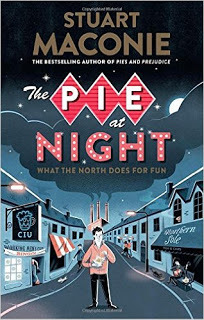
Published on May 24, 2016 00:59
May 20, 2016
The PR Corner - issue #2
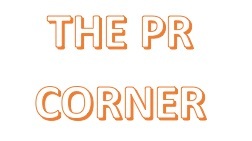 I was always a fan of Pseud's Corner in Private Eye. These days, the most purple prose I receive is often in the form of press releases for books being offered for review. I will provide an irregular series of these, both for your entertainment and, I hope, as pointers of what not to do with the press releases for your own books.
I was always a fan of Pseud's Corner in Private Eye. These days, the most purple prose I receive is often in the form of press releases for books being offered for review. I will provide an irregular series of these, both for your entertainment and, I hope, as pointers of what not to do with the press releases for your own books. Note that the books themselves could be brilliant... or not. But a poor press release is unlikely to generate many reviews. Names will be omitted to protect the innocent and guilty alike.
I suspect the problems are fairly self-evident, but just in case here's a few key pointers to look out for:
Who is celebrating this book?Science fiction and fantasy are not the same thing. Make up your mind which it is.I seriously doubt anyone is going to see the world in an entirely new light after reading it.Should it be a surprise that Thera and Arthe are anagrams of Earth?After some pretty grandiose claims, 'Will his side win?' seems a trifle limp for a cliff-hanger.Early five star reviews usually mean friends and relations.Are any authors reading this chomping at the bit so far? Does the writer know what 'chomping at the bit' means?Is it really possible to combine 'a heavy dose of fact' with fantasy?
[Title] : Celebrated Sci-Fi Fantasy Epic Hailed a “Melting Pot of Science, Fantasy & Adventure”X Y’s [Title], volume one of [Series Title], fuses science fiction and fact in a way that will force readers to see the world around them in an entirely new light. Meet The Keepers from Thera, who have responsibility to keep a balance between the interconnected relationships of Earth, Thera and Arthe, where good and evil fiercely battle to prevail. Then there’s Michael Stone, Keeper of [Title], a man who represents and stands for everything that is good. But will his side win? Find out in a new adventure that is already scoring five-star reviews.
FOR IMMEDIATE RELEASEUnited Kingdom – While many new fantasy authors vanish from the scene as quickly as they appeared, those able to carve out their own, wholly-unique new approach to the genre are the ones leaving authors chomping at the bit, and rapidly adding themselves to the bestseller lists. X Y is one such maverick, choosing to buck all trends by melding science fiction and fantasy with a heavy dose of fact.
Published on May 20, 2016 02:14
May 19, 2016
Do we pay for Channel 4? Understanding cost and price
 I recently mentioned on Facebook a petition to keep Channel 4 in public ownership (for non-UK readers, Channel 4 is a public service broadcaster, owned by the government and funded by advertising). I noted in my post on Facebook that Channel 4 doesn't cost a penny to the taxpayer. One of my commenters replied that ' It can't be said that it doesn't cost the tax payer, though. Anything that is funded by advertising is of course paid for by us, even if we don't have a TV, as a share of the cost of everything we ever buy goes on an advertising budget.' At first sight this makes sense - we pay for products, some of that money goes to the advertising, so we pay for the advertising. But the reality of costing and pricing is rather different and worth briefly exploring.
I recently mentioned on Facebook a petition to keep Channel 4 in public ownership (for non-UK readers, Channel 4 is a public service broadcaster, owned by the government and funded by advertising). I noted in my post on Facebook that Channel 4 doesn't cost a penny to the taxpayer. One of my commenters replied that ' It can't be said that it doesn't cost the tax payer, though. Anything that is funded by advertising is of course paid for by us, even if we don't have a TV, as a share of the cost of everything we ever buy goes on an advertising budget.' At first sight this makes sense - we pay for products, some of that money goes to the advertising, so we pay for the advertising. But the reality of costing and pricing is rather different and worth briefly exploring.I ought to say that I'm not an economist, but I did write the costing models for British Airways for some years, so I have some experience of costing in a large company, and also have a little sideline selling organ music and sing-along hymn CDs and downloads (no, really), for which I have to deal with pricing and costs like advertising directly.
The problem with the 'we do pay, because someone pays for the products' picture is that this only makes sense if prices were directly linked to costs. So it would be true if the company makes the choice to advertise, then they add a bit extra to the cost of the product so I, as the consumer, pick up that cost. But costing and pricing isn't like this. A price is set by the market. You look at what's out there and decide what the market will bear - what is the best price you can get for the product. That price will often be varied in special offers, or once you get a better idea of what sells and what doesn't. It is not in any sense derived from the costs. To say 'Yes, you do pay for advertising' makes no more sense than to say 'Yes, you do pay for the staff canteen.' Both are true at one level, but the fact that you do so makes no difference to the price, and so to say that we pay for an advertising supported service doesn't really make sense. It makes more sense to say that with a service that doesn't have advertising like the BBC or Netflix, you pay not to have adverts.
But why, if this is the case, do companies pay such attention to costs? It's not to set the prices, but rather to see if the price is viable. The costs that go into this fall into two categories, fixed and variable. While accurate, these are rather odd terms, as fixed costs are usually the ones you can vary, while variable costs are fixed as long as you go ahead with the product or service. This is because fixed costs are your overheads. You pay them whether or not you put on a service or put out a product. But variable costs are the costs of actually making and selling the product or service, so they are only received if you do that particular thing. Advertising is generally a fixed cost (though it can be variable if it is tied to a specific product).
To pull it all together, let's look at one of the products from my music site - a track downloaded from Amazon. Here is a non-vocal track, Bach's Air from Suite No. 33, better known as Air on a G string:

The track costs 99p. We spent some money last month on advertising, mostly on Google. So if you buy that track, are you paying for my advertising? I suppose so, technically. But the fact that I took out advertising had no influence whatsoever on the pricing. In fact Amazon sets the price in this case - I have no control over it. So the existence of the advertising has zero impact on what you pay. And that's all that matters to you. Just to rub it in, here is the same track on iTunes, where it only costs 79p:
 The fact that you indirectly pay for the advertising (unless I make a loss, in which case I pay for it) has no impact on the price you pay - so to say that you still pay for a service supported by advertising is misleading at best.
The fact that you indirectly pay for the advertising (unless I make a loss, in which case I pay for it) has no impact on the price you pay - so to say that you still pay for a service supported by advertising is misleading at best.
Published on May 19, 2016 00:31
May 18, 2016
The essential drivers of fiction: character and plot
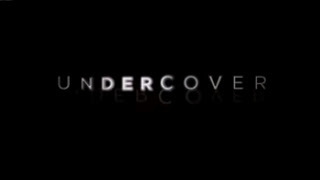 We've now come to the end of the BBC's thriller Undercover, and there is pretty well universal agreement that somehow a very promising concept had turned out something close to a disaster. (Spoilers after paragraph 4.)
We've now come to the end of the BBC's thriller Undercover, and there is pretty well universal agreement that somehow a very promising concept had turned out something close to a disaster. (Spoilers after paragraph 4.)Watching the show, I was reminded of a talk I attended a while ago on the nature of psychological thrillers. The speaker explained that the difference between a psychological thriller and a murder mystery was that the thriller is character-driven, while the mystery is plot-driven. And it was made clear that, from the speaker's viewpoint, this made psychological thrillers a higher form of literature.
The reality is, I suspect, far less black and white. While it's true that the plot-driven 'puzzle solving' aspect of a murder mystery usually takes centre stage, very few modern murder mysteries ignore character - think of something like The Bridge, for instance. But there is still a feeling among writers of 'literary fiction' that character is far more important than plot.
Unfortunately, Undercover demonstrates exactly why this is a disastrous line to take. The characterisation was good, although like many pieces with a pretention of sophistication, the character still have a certain formulaic nature (good cop/bad cop, three children: the academic, the fun one and the challenging one). But the plot was more full of holes than a colander.
I've already moaned about the way that central character, undercover cop Nick, supposedly took on the cover of being a crime writer - but how could you use a cover occupation that required you to have existing published books? But there were far more holes than this. The biggest one was the lack of internal logic. We don't usually notice it, but all fiction should obey an internal logic. It doesn't have to be the logic of this world - fantasy, for instance, applies a different set of rules - but once the logic is established it has to be followed through. In Undercover, this didn't happen. For example, we had the security services killing two people to cover up the fact that someone who died in British custody had committed a murder in the US. But there was no possible reason why this needed such a drastic cover-up. It was totally implausible.
The killings and Nick's cover story were by no means the only holes. Other oddities were the introduction of apparently significant events that then never played a part in the plot (Maya's epilepsy, the confession by the handler), Maya's ability to sway the US Supreme Court against the use of lethal injections, and the way that Maya, who up to now has been regularly racked by uncontrollable emotion, quite happily chatted with the man who had shot her critically ill son (strictly speaking that was more a character failure than a plotting one). I could go on and on. It was a plotting disaster.
So, by all means have a piece of writing that is primarily character driven. But don't think that this gives you the excuse to play havoc with the internal logic of the piece. The result is just irritation and frustration for the reader/viewer.
Image from Wikipedia
Published on May 18, 2016 01:16
May 13, 2016
King (to be) Conned
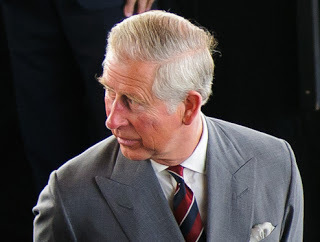 'Let them eat sugar pills!'We all have someone in the family who has slightly barmy ideas, and that's fair enough. But when that person has huge access to the media and aspirations to be monarch, it's a bit worrying. And what do you know, Prince Charles has done it again.
'Let them eat sugar pills!'We all have someone in the family who has slightly barmy ideas, and that's fair enough. But when that person has huge access to the media and aspirations to be monarch, it's a bit worrying. And what do you know, Prince Charles has done it again.He has recently told the world that we ought to attack the antibiotic resistance crisis by using homeopathy instead. Specifically (though not solely) when treating animals.
Let's be absolutely clear. There is no significant scientific doubt remaining about homeopathy. It has no medical benefit other than the placebo effect. Homeopathic pills are sugar pills. They are not medicine.
Although the Guardian article linked above is primarily about use in animals it does say that Prince Charles 'proposed a solution to the growing crisis of antibiotic over-use in animals and humans'. Anyone suggesting using homeopathic treatments for illnesses requiring antibiotics is potentially putting lives at risk.
As far as the animal side goes, this is often used as an argument by those who support homeopathy to show that it can't just be a placebo effect, because the animals don't know they are being given medicine. (Clever animals - they aren't.) However, this ignores the good quality trials showing that veterinary applications are just as much placebo as human. The animal might not know it is being given a medicine, but the person who is applying it thinks it is, and this changes the human's behaviour, producing any actual effects. In many cases though, the 'effect' is simply imagined - either the animal would have got better anyway, or the person sees what they want to see.
When I wrote Ecologic, for the section on organic farming I interviewed an organic milk producer who was genuinely upset about the health of his cattle because the Soil Association forced him to use a homeopathic treatment first, and his animals were suffering as a result. Even though we may not be so concerned about the feelings of animals compared to humans, we still shouldn't be putting them through this.
I headed up this article with the word 'conned' rather than 'con'. I believe that Prince Charles is absolutely genuine about this, rather than being in the pay of the suppliers of Duchy Organics etc. However, it is entirely inappropriate for him to make this kind of intervention and shows again the less palatable side of the monarchy.
Image from Wikipedia:
This image was originally posted to Flickr by National Assembly For Wales / Cynulliad Cymru at http://flickr.com/photos/39069511@N03/5842299392. It was reviewed on 29 August 2011 by the FlickreviewR robot and was confirmed to be licensed under the terms of the cc-by-2.0.
Published on May 13, 2016 04:40



